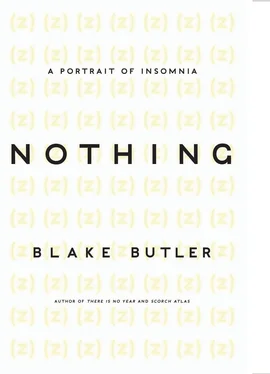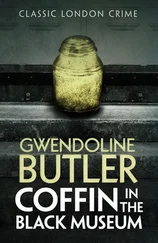]
]
]
Among the spectrum of extended sleep deprivation, my own 129-hour bout is relatively unremarkable. Besides the countless unrecorded bouts occurring any evening in any home, there have been numerous well-documented bouts of people going quite further, if some simply to prove a point. In 1959, radio DJ Peter Tripp set a record by not sleeping for 201 hours, mostly confined inside a glass booth located in Times Square. A few days in Tripp became delirious and began to laugh maniacally at things that did not seem funny. He saw insects on the air, could not understand architecture, began to claim he was not himself, but someone else. Soon after the event, he is said to have suffered from a shift in personality: he lost his job, got involved in a payola scandal, went through four divorces, fried. Some claimed the experiment had forever changed his life. In 1964, seventeen-year-old high school student Randy Gardner upped the record to 264. The first seventy-two hours were reported rather calm. On day four Gardner believed he had turned into San Diego Chargers running back Paul Lowe and won the Rose Bowl. He became convinced a street sign was a person. Afterward, he claimed to find it easy to return to a normal sleep cycle. Later that same year Toimi Soini of Hamina, Finland, snatched the title at 276 hours, which held for thirteen years until 1977, when Maureen Weston, a British woman, took up residence in a rocking chair for 449 hours, during which she claimed to hallucinate but also claimed no long-term complications. In 1989, the Guinness World Records ceased tracking the phenomenon, for fear of potentially damaging effects.
Beyond these self-induced milestones — which seem exceptions as they are chosen actions, rather than activities of the choicelessly awake — it is hard to know what the truest length of sleeplessness could be — though several cases, however uncorroborated, appear in which people claimed to have ceased to sleep at all. Al Herpin, who lived from 1862 to 1947, claimed never to have slept an hour of his life. His home contained no bed. He had a rocking chair he claimed to sit and “rest” in, reading, until dawn. In 2005, in the Ukraine, Fyodor Nesterchuk claimed to have not slept in more than twenty years. A series of doctors could not medicate him under or locate any cause. In the daytime he sells insurance. At night, he rereads the small number of books inside his house.132 “I feel rather bad now,” he said. “I am like a plant without water.” In 2006, a Vietnamese farmer, Thai Ngoc, he’d gone on for even longer — more than thirty years, beginning with a fever he had in 1973.133 He farms by day and hunts at night and sits out afterward under the stars. He claims to have learned to predict the weather. He’s hired by local mourners to beat a drum to guard their houses at night while they nap.134 He refuses to be tested, though news crews film him working four straight days in his rice fields without any sign of wear. “[My] biggest dream,” he said, “is to have a dream.”
In each of these cases, no medical data gives evidence unto the cause of the prolonged condition, though physicians speculate various theories, such as microsleeping or damage to specific areas of the brain. It is also generally accepted that because there is no perceived damage to the body — the men are happy — there should be no cause for concern. Even if their stories are stretches, lies, wormholes in an idea, they hold a resonance in being said, in taking up space in ways of speaking and thinking about bodies’ mythology. Regardless of the doubt or conflicting visions, or constraints on these kinds of lore-made reachings, their ideas project an aura in the idea of what they are, likewise the backmasked slurs on records, cryptic codes of pyramids, rearranged books of certain bibles, the dialogue of crime-ripped rooms, drowned rooms, rooms where lives are ended and begun. In their imaginings, they are created. Speech renders in residue, one could argue, a thing alive: a mashed mask in network in the clear air, held night and day and day and night. In many ways, insomnia is as accumulation, borne out of a lack thereof — false polar magnets in nerve endings — a growing heat, a colder skin. More than the toss, what sticks inside the mind is the between-time, the waiting unto nothing, the texture of the air inside the house inside the house, like curtains sewn from spindles we could not see other hours. During my 129 hours, I would laugh through my whole head out of horror, to feel the shake of sound as it rushed out. I stood at some point for several hours stock still, mostly naked, in the long hall that divides our house, hung with pictures of me and my sister growing older, and the quilts my mother and her mother’s mother made from cotton bolts using their hands. In thinking back, this whole block of black time seems dually curling and encubed: massed beside itself and in a long row that could be lifted upward by a hand, if only through the light and hours since then I could find a way to fit my arm into the right hole in this house now, any hour.
As the sleepless state increases in duration, some of that other light might begin crossing over, blending in. Things begin to function slower, more prolonged and spread so thin they both cover all and cover none. The brain feels thicker with itself in such a way that it can no longer read its own map for the new meat making on its frame. The insomniac is often found just as hyper-aroused during waking hours as at night, suggesting it is less a sleep-focused conditional disorder, and more a kind of body, a way of sight — even if, in the crossover, the lack of resting makes the flesh more exhausted, harder to connect — a dual removal and instigation — a neutered state of the aware. Where there might begin to seem a third door in your apartment, the door is never really, palpably there, one’s sleep’s sublime logic cannot be fully entered, and therefore the magic of the dreaming becomes replaced by dead nodes, mirages of a whole other way: the furor instead eating at the memory, at clean awareness. The light in rooms might seem even more heavy, or in other ways not there at all. Speech or want for speech might grow more difficult, against you, a dreamworld’s tongues becoming activated in the head but here awake coming out all wrong, a smear. Our rooms and people suddenly therein seeming at even further distance than they might be, with their own heads, and then suddenly much closer, amassed with veils of who they might have meant to be to you inside lost sleep. The house somehow more alive than it has ever been, but not at all here yours, and you inside such watching buried in you under all the you of you you aren’t.
]
]
]
If this sounds romantic, or transcendent, it is not — or at least not mostly, for the true chronic, as the silent weight quickly begins to pile up. Motor skills are weaker, reactions deadened. There might be less will at all to move. Further damage comes in the form of stasis, including ruin of “cognitive flexibility, the ability to change strategy, originality, and generation of unusual ideas.”135 It is less a chemical or neurological shift than an overall slurring, a mashing down of two very different kinds of world. Though it may seem, from a removed state, that the flood of dream brain into waking might allow blooming, instead it functions as extrication, like wearing the residue of one’s self around the body as a costume or second skin. It can be difficult to feel at all pleased, to feel joy of any sort, beyond perhaps the long slow bowed notes of selves in separation, blank. Whereas at first the skin feels maybe steamy, at least looser, it begins to switch to something more like smoldering, tugged at from many angles — not synthetic, but not yours. Your features might seem deeper set into your face frame. You’re wearing goggles. With this new mouth it is difficult to chew. Jesus Christ, the light is bright here. Is something burning? Where are all my socks? The walls and widths of rooms or doorways might seem to reach right out and bump against you, their dimensions variable, attempting bruise. In worst months, I have knocked my elbows and shoulders coming and going enough times to want to never move again. Trying to run comes off like underwater, your voice deeper, the ache of negotiating limbs — around the house in the night from room to room in lighting like a bug in search of flame seeing no flame, standing in the vowel-sounds coming out of lamp bulbs shading sections of the same wall waiting, waiting that one might come kicked open, in, or out, allow another kind of light in or out. The way the hands began to feel dusted as with chalk, or else chalk-outlined in walking around. The simultaneous hypersensitivity and dulled dimension of how touching anything leaving a film both of you on it and it on you, making, in mapmaking, a traced-out residue of where you’ve been, and perhaps, looking hard enough, in the right way, where you’ll go.
Читать дальше












